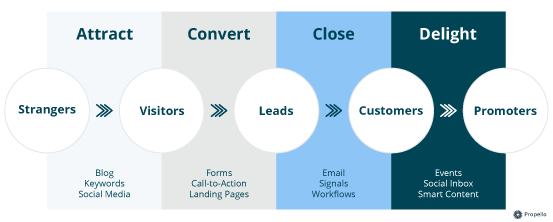In today's fiercely competitive digital landscape, standing out is essential. As a marketing manager or professional, you understand the pivotal role of Pay-Per-Click (PPC) advertising in capturing audience attention, driving website traffic, and boosting conversions.
Crafting an effective PPC campaign strategy is not just about placing ads; it's about strategically guiding potential customers toward your offerings.
PPC advertising allows you to place ads on various platforms and pay a fee only when your ad gets clicked. This method ensures you reach your target audience directly, making it a cornerstone of online marketing strategies.
In this comprehensive guide, we will delve into the intricacies of creating a compelling PPC campaign strategy. Let's embark on a journey to unravel the essential steps that marketing managers and professionals can take to craft an impactful PPC campaign strategy.
|
Pay-Per-Click (PPC) Pay-per-click (PPC) is an online advertising model in which advertisers pay a fee each time their ad is clicked, typically used to drive traffic to websites and increase visibility in search engine results. |
What is Pay-Per-Click (PPC)?
In the intricate world of digital marketing, Pay-Per-Click (PPC), stands as a cornerstone strategy that empowers businesses to reach their target audience with precision and efficiency.
At its essence, PPC is an online advertising model where advertisers pay a fee each time one of their ads is clicked. This method of advertising allows businesses to buy visits to their websites rather than earning those visits organically.
As a marketing professional, it's imperative to familiarize yourself with the key terms associated with PPC, such as Cost Per Click (CPC), Click-Through Rate (CTR), and Quality Score. These metrics form the foundation of your campaign analysis, providing insights into the effectiveness of your strategy.
Here's a breakdown of the fundamental aspects of PPC:
1. How PPC Works
Advertisers bid on specific keywords relevant to their target audience. When users conduct online searches using those keywords, the ads may appear prominently in the search engine results.
2. The Auction System
PPC operates on an auction system, where advertisers compete for ad placement. The auction considers bid amounts, ad relevance, and the quality of the landing page.
3. Payment for Clicks
Advertisers only pay when users click on their ads, hence the name Pay-Per-Click. This model ensures that businesses are charged based on actual engagement rather than simply displaying an ad.
4. Key PPC Platforms
PPC is employed across various platforms, with Google Ads and Bing Ads dominating search engine advertising. Social media platforms like Facebook, Twitter, and LinkedIn also offer PPC advertising options.
5. Ad Placement
PPC ads can appear at the top or bottom of search engine results pages (SERPs). On social media platforms, they may appear in users' feeds or on the sidebar.
6. Ad Types
PPC encompasses various ad types, including text ads, display ads, and product listing ads. Each ad type serves specific purposes and caters to different stages of the customer journey.
7. Measuring Performance
PPC campaigns are meticulously monitored through key performance indicators (KPIs) such as Cost Per Click (CPC), Click-Through Rate (CTR), and Conversion Rate. This data guides advertisers in refining their strategies and maximizing return on investment.
In essence, PPC provides your business with a targeted and measurable way to connect with potential customers actively seeking products or services. Its flexibility, precision, and ability to deliver rapid results make PPC an invaluable tool in the digital marketer's toolkit.
Benefits of PPC (Pay-Per-Click) Advertising
Embracing a PPC strategy unlocks a myriad of advantages for businesses looking to enhance their online presence, drive targeted traffic, and achieve measurable results. Understanding these benefits positions you to harness the full potential of PPC in your digital marketing arsenal.
1. Immediate Visibility
PPC provides an instantaneous way to appear at the top of search engine results pages (SERPs) or on social media platforms. This immediate visibility is particularly valuable for time-sensitive promotions, product launches, or other strategic initiatives.
2. Targeted Reach
Precise audience targeting is a hallmark of PPC advertising. Advertisers can tailor their campaigns based on demographics, locations, interests, and even device types, ensuring that their ads reach the most relevant audience.
3. Cost Control
PPC offers flexibility in budget allocation, allowing advertisers to set daily or campaign-specific spending limits. With the pay-per-click model, businesses only incur costs when users actively engage with their ads.
4. Measurable ROI
Robust analytics tools provide detailed insights into the performance of PPC campaigns. Advertisers can measure key metrics such as Cost Per Click (CPC), Click-Through Rate (CTR), and Conversion Rate, enabling precise ROI calculation.
5. Customizable Ad Formats
PPC supports various ad formats, including text ads, display ads, shopping ads, and video ads. Advertisers can choose the format that aligns with their campaign objectives and effectively communicates their message.
6. Remarketing Opportunities
PPC enables remarketing strategies, allowing businesses to re-engage users who have previously interacted with their brand. This strategic approach reinforces brand awareness and encourages users to convert on subsequent visits.
7. Flexible Campaign Management
Advertisers have the flexibility to make real-time adjustments to their campaigns. Whether optimizing bids, refining ad copy, or pausing underperforming keywords, PPC campaigns can be finely tuned for optimal results.
8. Enhanced Brand Exposure
PPC extends beyond search engines to encompass social media platforms, expanding the reach of a brand's messaging. This multi-channel exposure contributes to increased brand awareness and recognition.
9. Global Reach
For businesses with a global audience, PPC offers the ability to target users across different regions and languages. This expansive reach opens doors to new markets and audiences.
10. Data-Driven Decision-Making
PPC provides a wealth of data that informs strategic decision-making. Analyzing performance metrics allows marketers to identify trends, optimize campaigns, and continually refine their approach.
As you navigate the intricacies of PPC advertising, recognizing and leveraging these benefits positions you to craft campaigns that not only meet but exceed your marketing objectives. The agility, precision, and measurable impact of PPC makes it a dynamic tool for driving business growth in the digital landscape.
How to Develop an Effective PPC Campaign Strategy
1. Setting Clear Campaign Goals
Every successful PPC campaign starts with a clear set of goals. As a marketing manager, ask yourself: What do you aim to achieve with this campaign? Are you focused on increasing brand awareness, driving website traffic, or maximizing conversions?
Here are some common PPC goals:
- Increase website traffic
- Generate leads
- Drive sales
- Raise brand awareness
Align these objectives with your broader marketing strategy. Establish measurable Key Performance Indicators (KPIs) to gauge your campaign's success. Whether it's boosting sales, generating leads, or enhancing brand visibility, a well-defined set of goals provides direction for your entire PPC strategy.
2. Conducting In-Depth Keyword Research
Keywords are the backbone of any PPC campaign. Thorough keyword research ensures that your ads are shown to the right audience. Put yourself in the shoes of your potential customers.
What terms or phrases might they use when searching for products or services like yours?
Utilize keyword research tools to identify relevant and high-performing keywords. Don't overlook the power of long-tail keywords – these more specific phrases can attract a highly targeted audience, improving the quality of your traffic.
3. Crafting Compelling Ad Copy
Once you've identified your keywords, the next step is to create compelling ad copy. Your ad copy should not only be persuasive but also relevant to the user's search intent.
Craft attention-grabbing headlines and concise, persuasive descriptions that communicate the value of your offering.
A/B testing is a valuable tool at this stage. Experiment with different ad copies to determine which resonates most effectively with your audience. Regularly refine and optimize your ad copy based on performance data.
4. Targeting the Right Audience
Precise audience targeting is the hallmark of a successful PPC campaign. Leverage the targeting options provided by the platform – whether it's demographic targeting, location-based targeting, or custom audience creation.
Align your targeting strategy with your overall marketing personas to ensure your ads reach the most relevant audience.
Consider incorporating remarketing strategies. Re-engage users who have previously interacted with your brand but didn't convert.
This strategic approach reinforces your brand in the minds of potential customers, increasing the likelihood of conversion.
5. Budgeting and Bid Management
Effective budget allocation is a critical aspect of PPC campaign management. Determine your budget based on your campaign objectives and the competitiveness of your industry. Bid management involves setting the maximum amount you're willing to pay for a click.
Consider the balance between bidding aggressively to ensure visibility and maintaining a cost-effective strategy. Regularly monitor and adjust your bids based on the performance of keywords and ad placements. Automated bidding options can assist in this process, optimizing your bids for maximum ROI.
6. Using Ad Extensions
Ad extensions enhance the visibility and effectiveness of your ads. These additional pieces of information provide more context and encourage user engagement.
Common ad extensions include site link extensions, callout extensions, and structured snippet extensions.
Take advantage of the available extension options to provide users with more reasons to click on your ad. Whether it's highlighting specific products, showcasing customer reviews, or promoting limited-time offers, ad extensions contribute to a more comprehensive ad experience.
7. Implementing Conversion Tracking
Understanding the impact of your PPC campaign on actual conversions is paramount. Implement conversion tracking to measure the actions users take after clicking on your ad. This could include completing a purchase, filling out a form, or signing up for a newsletter.
Set up conversion tracking tools provided by the platform or integrate third-party tools to gain deeper insights into user behavior. Analyze conversion data to identify high-performing keywords, successful ad copies, and areas for improvement.
8. Continuous Monitoring and Optimization
The digital landscape is dynamic, and your PPC strategy should be too. Regularly monitor the performance of your campaign and make data-driven optimizations.
Analyze key metrics such as CTR, CPC, and conversion rates. Identify underperforming elements and refine your strategy accordingly.
Optimization is an ongoing process. Experiment with different approaches, test new keywords and adjust your targeting parameters. Stay informed about industry trends and platform updates to stay ahead of the curve. A proactive and adaptive approach ensures your PPC campaign remains effective in a constantly evolving digital environment.
Integrating PPC with Overall Inbound Strategy
Your PPC campaign shouldn't exist in isolation; it should seamlessly integrate with your broader inbound marketing strategy. Align your messaging, branding, and offers across all digital channels. Ensure a consistent user experience from the initial click to conversion and beyond.
Consider how PPC fits into the customer journey. Are there opportunities for cross-channel promotions? How can insights from your PPC campaign inform content creation and other inbound activities?

By integrating PPC into your overall marketing strategy, you maximize its impact and contribute to a cohesive brand presence.
Build a PPC Campaign Strategy
Crafting an effective PPC campaign strategy requires a strategic mindset, a deep understanding of your audience, and a commitment to continuous improvement.
As a marketing manager or professional, implementing these steps will set you on the path to PPC success. From setting clear objectives to integrating PPC into your broader strategy, each element plays a crucial role in achieving optimal results.
Remember, PPC is not a one-size-fits-all endeavor. Regularly evaluate your campaign's performance, adapt to changing market dynamics, and leverage data to refine your approach. With a well-executed PPC strategy, you can drive targeted traffic, increase brand visibility, and achieve tangible business objectives.
Embark on your PPC journey with confidence, knowing that a carefully crafted and optimized campaign has the power to elevate your brand's online presence and drive meaningful results.
Elevate your PPC performance and redefine your digital success. Contact Fine Media today and let us propel your brand to new heights. Your journey to impactful PPC campaigns begins with Fine Media – where expertise meets excellence.



